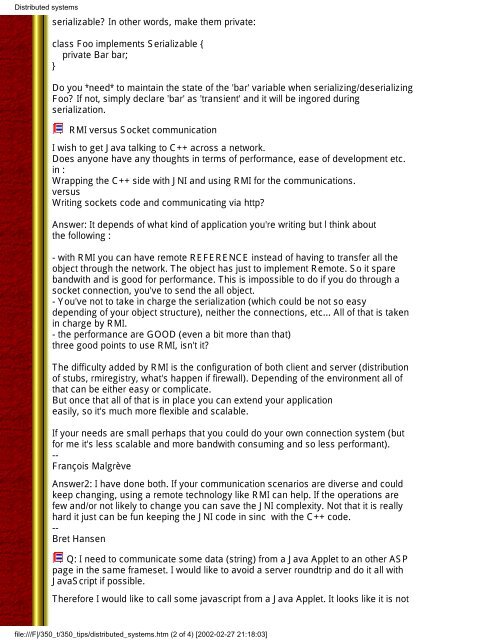You also want an ePaper? Increase the reach of your titles
YUMPU automatically turns print PDFs into web optimized ePapers that Google loves.
Distributed systems<br />
serializable? In other words, make them private:<br />
class Foo implements Serializable {<br />
private Bar bar;<br />
}<br />
Do you *need* to maintain the state of the 'bar' variable when serializing/deserializing<br />
Foo? If not, simply declare 'bar' as 'transient' and it will be ingored during<br />
serialization.<br />
RMI versus Socket communication<br />
I wish to get <strong>Java</strong> talking to C++ across a network.<br />
Does anyone have any thoughts in terms of performance, ease of development etc.<br />
in :<br />
Wrapping the C++ side with JNI and using RMI for the communications.<br />
versus<br />
Writing sockets code and communicating via http?<br />
Answer: It depends of what kind of application you're writing but l think about<br />
the following :<br />
- with RMI you can have remote REFERENCE instead of having to transfer all the<br />
object through the network. The object has just to implement Remote. So it spare<br />
bandwith and is good for performance. This is impossible to do if you do through a<br />
socket connection, you've to send the all object.<br />
- You've not to take in charge the serialization (which could be not so easy<br />
depending of your object structure), neither the connections, etc... All of that is taken<br />
in charge by RMI.<br />
- the performance are GOOD (even a bit more than that)<br />
three good points to use RMI, isn't it?<br />
The difficulty added by RMI is the configuration of both client and server (distribution<br />
of stubs, rmiregistry, what's happen if firewall). Depending of the environment all of<br />
that can be either easy or complicate.<br />
But once that all of that is in place you can extend your application<br />
easily, so it's much more flexible and scalable.<br />
If your needs are small perhaps that you could do your own connection system (but<br />
for me it's less scalable and more bandwith consuming and so less performant).<br />
--<br />
François Malgrève<br />
Answer2: I have done both. If your communication scenarios are diverse and could<br />
keep changing, using a remote technology like RMI can help. If the operations are<br />
few and/or not likely to change you can save the JNI complexity. Not that it is really<br />
hard it just can be fun keeping the JNI code in sinc with the C++ code.<br />
--<br />
Bret Hansen<br />
Q: I need to communicate some data (string) from a <strong>Java</strong> Applet to an other ASP<br />
page in the same frameset. I would like to avoid a server roundtrip and do it all with<br />
<strong>Java</strong>Script if possible.<br />
Therefore I would like to call some javascript from a <strong>Java</strong> Applet. It looks like it is not<br />
file:///F|/350_t/350_tips/distributed_systems.htm (2 of 4) [2002-02-27 21:18:03]






